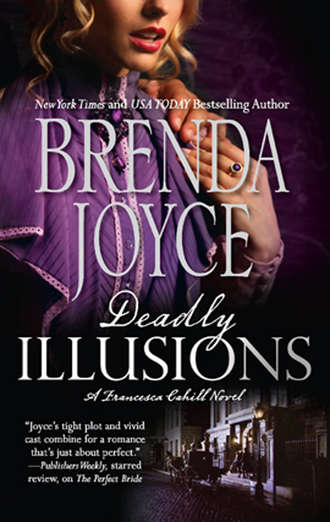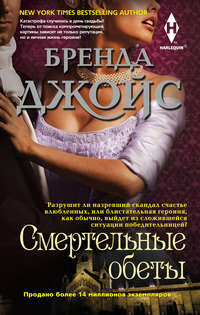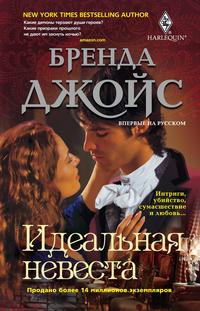
Полная версия
Deadly Illusions
“Joel, spitting is ungentlemanly and it was uncalled for.”
He sighed. “Sorry. I’ll wait over there,” he said, gesturing with his head in some other direction.
“I won’t be long,” she said, smiling again. She patted the cap on his head and hurried up the granite steps and into the reception room.
As always, it was filled with civilians lodging one com plaint or another, newsmen looking for a scoop, recently apprehended thugs and rowdies waiting their turn to be formally charged and locked up, and the policemen and officers handling it all. Several staff were behind the long reception counter, including Sergeant O’Malley, and she waved at him. He nodded at her and called out, “He’s upstairs. Door’s open, I think.”
She had become a frequent visitor at police headquarters and needed no formal permission to come and go. No one seemed to have noticed, though, that she had not been present at the station in several weeks. Turning to hurry upstairs—she never used the elevator—she bumped into a man.
It was Arthur Kurland from the Sun, a snoop whom she thoroughly disliked. She should have expected this, as he was always at headquarters and just as often seeking her out. He smiled at her, steadying her. “I haven’t seen you at the station house in a long time, Miss Cahill. What brings you here?” He seemed delighted to see her.
She did not even try to pretend that she didn’t dislike him. After all, he was privy to far too many secrets. He had uncovered her brief romantic attachment to Bragg and Francesca sensed he was waiting to reveal the fact of their past liaison when it would be the most harmful foreveryone.
“Good morning.” She was brisk. “Surely you have heard by now that a woman was found murdered yesterday and that it might be the work of the so-called Slasher?” Trying to be imperious, she raised both pale eyebrows.
“Yes, I have. I take it you are on the case?”
“I am.”
He whipped out his notepad. “Any new leads?”
“I’m afraid it is far too soon to be speaking to the press.”
“Dear God, an arctic chill has just entered the room!” He laughed and tucked the pad and pen back into the breast pocket of his jacket, then adjusted the felt fedora he always wore. “You were only too eager to spill the beans last month when you were chasing after Tim Murphy and his gang.”
She scowled. “I had hoped that leaking information to the press might aid my investigation. This investigation is in the preliminary stages. I refuse to compromise it. Good day.” She shoved past him.
He quickly caught up. “Hmm, compromise. An interesting word. So, Miss Cahill, there are some things you will not compromise?”
Aghast, she faced him, feeling all the color drain from her face. She had been compromised more than once when alone with Rick Bragg and this man knew it. “That was unbearably rude. What do you want from me?”
“Does your fiancé know you are here and working with the man he hates more than anyone else?”
She stiffened. How did Kurland know that? “Calder doesn’t hate Rick Bragg. Calder and Rick are half brothers. They are close.” And, as she lied so baldy, she felt her cheeks turn red.
He laughed. “If you say so! But isn’t it difficult, spending the day with one man—and the evening with the other?”
She could barely respond, she was so livid. “You have the social grace of an ape, Mr. Kurland.” And she stalked away.
He followed. “It’s why I’m such a good reporter. Sure you don’t have a lead for me? Anything?”
She halted in her tracks and whirled and he crashed into her. They leaped apart. Panting, she said, “Are you attempting to blackmail me?”
“Moi?” He was incredulous. “Never, Miss Cahill.”
“A wise decision.” She wondered if she dared tell Hart about how dangerous this man was becoming. But then she would have to reveal the extent of her prior relationship with Bragg to him. And that would be dangerous, indeed. “Good day.” Her tone was final and she hurried up the stairs.
He stood at the bottom landing and called up, “And to answer your previous question, Miss Cahill, I haven’t decided what it is that I want from you.”
She glanced down and met his cool gaze and stumbled. As she righted herself, he tipped his hat in the most disrespectful manner and walked away. Filled with unease, she stared after him.
She knew she must warn Bragg. Quickly she turned and hurried up the hall to his office. His door was ajar but not open, solid wood on the bottom, the glass opaque on the top. She knocked and it swung wide.
His desk faced the door, a window that looked out over Mulberry Street behind him. She expected to find him up to his elbows in work—his desk was always stacked high with files—but instead, she found him sitting there, staring off into space, looking impossibly sad. She froze.
This was not the time, she realized, to burden him with Arthur Kurland. But what was wrong?
He started as he realized that she was present and jumped to his feet, smiling slightly, but Francesca knew him well enough to know the expression was forced. He was preoccupied and disturbed. And she had not mistaken the sadness in his eyes.
“Good morning,” he said, coming forward. There was a fireplace on the other side of his desk with numerous photographs on the mantel, mostly of his vast family, although several were of him with President Roosevelt or with the mayor. But there had never been a picture there of Hart, his half brother, or of Leigh Anne, his wife. Now the first thing she saw was a huge portrait of Leigh Anne in an oval silver frame. It dominated the mantel and every other photograph placed there.
She quickly tore her gaze from the photograph, managing a smile. “Good morning. I hope I am not interrupting.”
And suddenly his facade vanished. His smile gone, he took her arm, guiding her to one of the two upholstered chairs in front of his desk. “You could never be an interruption,” he said.
She did not sit. “What’s wrong, Rick?”
Instantly he turned away. “Nothing.”
She didn’t move, staring at his back until he sat down be hind his desk, facing her once again. He lifted a file. “Heinreich is almost certain that the same knife was used on all three victims.”
She did not want to discuss the case now. Something was terribly amiss. “Has something happened? Are the girls all right?”
“The girls are fine. The Slasher is at work, Francesca, and now the question is who will his next target be, and will he strike again on Monday?” Bragg handed the file across the desk. “I am glad you are on this case,” he added. “We don’t have much time.”
She took the file but did not open it; she could only stare. He looked away. Clearly he did not wish to discuss anything personal with her. Yes, everything had changed, because not very long ago he would open his heart to her without a moment’s hesitation. The urge to be his friend—a real friend—and to help him now overcame her, but so did guilt. What right did she have to the happiness she had just been feeling when his life was causing him such anguish? Surely, whatever was wrong, it could be fixed. Surely she could help! She had to help. Otherwise she was no friend at all.
But now was not the time to push or pry. As hard as it was to back away, she would do just that. She took a deep breath and opened the file. “Margaret Cooper was killed Monday afternoon, between noon and 4:00 p.m.,” she read from the file’s notes. A chill tickled her nape and she knew she was missing something very important. “So Margaret was not attacked at night like the others.”
“No.”
She glanced back at the file. “Her neck was cut with a blade no more than three inches long.” Surprised, she looked up. “Would that not be a common pocketknife?”
“Yes.”
Diverted now from Bragg’s private dilemma, she saw that it had not been an easy task to sever Margaret Cooper’s jugular. Some sawing had been involved. And the same dull blade had been used on all three victims, the cutting from right to left. She looked up. “In all likelihood, the Slasher is right-handed.”
“Yes.” He was intently focused on her now. “Apparently there is a nick on the murder weapon, a small indentation on what Heinreich believes to be the right side of the blade. That nick has caused a slight vee on the track of the slit on Miss Cooper’s throat. He said he noticed it on Kate Sullivan’s wound as well, but at the time thought nothing of it.”
“That is a wonderful clue!” She handed the file back to him and sat staring at him, wide-eyed. He stared back as thoughtfully. Her mind raced, but not conclusively. Something continued to nag at her, but she could not identify it. She heard herself wonder, “Is he going to sharpen that knife? And if so, will the nick be filed out?”
“Your guess is as good as mine.” Bragg rocked in his cane-backed chair. “I hope not,” he added.
She continued to think. “I see that there was no forced entry at Margaret Cooper’s. Did he pick the lock? Attain a key? Follow her inside?”
“There was no forced entry at Sullivan’s or O’Leary’s, either. None of the two women have any idea how he got inside their flats,” Bragg said. “I take it you will interview both women today?”
“I intend to try,” Francesca said grimly. And then she knew what she was missing and she shot to her feet. “Bragg!”
His eyebrows lifted and he stood. “What is it?”
“Bridget O’Neil stayed home from school on Monday! She had a cough. She was at home—alone—when Margaret Cooper was murdered.”
For one moment, he simply stared back at her. Then, “I cannot get away for a few hours.”
She almost smiled, for she knew exactly what he was thinking. “I did not notice her coughing yesterday. She is probably in school now, anyway.”
“Yes. How does 4:00 p.m. sound?”
“I’ll meet you at the O’Neils’.”
IT WAS NOON WHEN she stepped out of a hansom cab in front of the attractive limestone building that housed the Lord and Taylor store on the corner of Nineteenth Street. Paying the driver, she thanked him and hurried up Fifth Avenue to the wide, arched entrance. Once inside, Francesca saw that the ground floor was already crowded with dozens of ladies. Bragg had told her that Francis worked at the perfume and soap counter. She had not been to Lord and Taylor’s in some time, having no personal inclination for shopping, so she had no idea where that counter might be amongst the many others.
Facing her was a long counter filled with gloves, surrounding shelves of hats. Francesca glanced aside and saw a counter selling French and Belgian chocolates, and then she froze in disbelief. Had she just seen Hart’s former mistress at the glove counter?
Slowly, she looked back toward that glove display and her heart lurched wildly. Standing there, pulling on a delicate pair of beaded evening gloves, was none other than Daisy Jones.
Francesca felt hot. She started to fan herself with her purse. Daisy had yet to see her, and of course, Hart no longer visited her. Not only had he promised Francesca fidelity from the moment she had accepted his proposal, she had been eavesdropping on him when he had bluntly told Daisy of his intention to one day marry Francesca. That had been well before Francesca had had any intention of ever accepting him, and his words to his mistress had been a shock. He had coldly told Daisy that their relationship would be over from the moment Francesca became his fiancée.
Fanning herself did not help and she unbuttoned her gray jacket. She had gotten into a lot of trouble that day, for she had also watched Hart and Daisy indulge themselves in a bout of raw passion. She would never forget what she had seen.
She was at a loss, unsure of whether to approach Daisy or not, as once they had been on friendly terms. Of course, that had changed with her engagement to Hart—and the realization that she really wanted to marry him, that she had very strong feelings for him.
Francesca decided that there was no point in greeting the other woman. Because Daisy and Hart had originally agreed to a six-month liaison, he continued to allow her to live in the house he had bought for her, in spite of their breakup, until that six-month period had lapsed. There were still three full months left on that arrangement and Francesca knew that for a fact. But as she was about to hurry away, Daisy laid the evening gloves down, apparently declining to buy them, and turned and saw Francesca.
Her beautiful blue eyes widened.
Francesca halted and smiled so widely her face seemed to turn to plaster. “Daisy!” she cried as if the other woman were her very best friend. “I haven’t seen you in so long! How are you?” She went forward and grasped the slim woman’s shoulders while pecking her cheek.
Daisy smiled back. She was one of the most beautiful women Francesca had ever seen, so delicate and fragile in appearance, as pale as an alabaster statue with her platinum hair and fair complexion. Francesca knew exactly why Hart had made her his mistress and as always, when faced with just how lovely Daisy was, she failed to understand how he could refuse her bed now. There was simply no way that Francesca could ever compete in beauty, grace and elegance. The other woman also happened to be from a genteel background, although Francesca had never learned why she had become a fallen woman. When confronted with Daisy in the flesh, Francesca always felt tall, overweight and gauche.
“Francesca, this is such a pleasant surprise,” Daisy said softly in her wispy, childish voice. “Are you shopping?” She seemed mildly incredulous.
“Actually, I am on a case. I am here to interview someone.” Francesca continued to smile, although it had become painful. Of course, Hart would choose the most beautiful woman in the city to warm his bed, just as he bought the most controversial art, the most handsome and modern carriage, the fastest, most elegant horses. So the real question was, why did he wish to have Francesca in bed?
She could understand his rationale for marriage. They were friends. Hart admired and respected her and had never, not once in his life, had a friend before. But why not marry her and keep women like Daisy for his sensual entertainment? Now Francesca was sweating. She reminded herself that Hart did want her in bed, and he had proven it to her more than once, including last evening.
“I so admire you.” Daisy smiled, touching Francesca’s arm very lightly. “You are so clever, so bold. And Hart clearly thinks as I do. He is so proud of you, Francesca.”
“I’m not sure of that,” Francesca said, finally allowing her smile to vanish. Her cheeks ached anyway.
“Can I see the ring he gave you?” Daisy asked almost eagerly.
Francesca pulled off her kidskin glove. For one moment Daisy was still as she gazed at the huge diamond, which must have cost several fortunes. Then she smiled and looked up with admiration in her gaze. “Calder must be smitten.”
“Hart doesn’t believe in love,” Francesca said, and the moment the words were out, she wished to kick herself. It was true—Hart felt love was for fools and had been clear from the start that he was not about to succumb to the emotion, even if it could exist for him. Still, why not let the other woman think that Hart was in love?
Daisy’s very pale eyebrows lifted and her nearly turquoise-blue eyes were wide. “Still, he wishes to marry you. You are the talk of the town, Francesca, and the envy of every lady of marriageable age. Rose and I were just discussing it last night.”
Francesca desperately wanted to change the topic. “How is Rose?” she asked quickly. Rose and Daisy were best friends and, Francesca knew, longtime lovers, a relationship that both shocked and fascinated her.
“Wonderful,” Daisy said with a happy smile. “Now that Hart no longer visits me, she is allowed to come and go as she pleases.” Her smile vanished and she leaned close, confiding, “He was simply so possessive when we first began our affair. He was livid at the thought I should even want to chat with Rose and he refused to allow her even platonic visits. How jealous and controlling he was!”
Francesca hugged herself. That certainly sounded like Calder Hart.
Daisy smiled again. “But you must know that. I mean, you are now the focus of his attention, so surely you are receiving his outbursts of jealous rage.”
Francesca felt warning bells go off. She knew she must end this conversation and find Francis O’Leary. “Yes, Hart can certainly be jealous and demanding. Daisy, I must go.” But she felt oddly ill. Not too long ago Hart had been jealous over Daisy. Now he was jealous where she was concerned.
But Daisy took her hand, holding it tightly so that she could not leave. “Francesca, I must have a word with you!” she cried, appearing worried now.
Francesca knew that no good could come of any further conversation. “I really must go.” She shrugged free and started to flee.
“Rose and I are so worried about you. You are too naive to manage a man like Hart!” Daisy cried to her back.
Francesca halted in her tracks. Slowly, she turned to face the woman she had once sincerely liked and was now desperately afraid of. “I am not naive.”
Daisy went to her and gripped both of her hands. “Three months ago, Hart could not stay out of my bed. Night and day, he was there, and any man who looked at me was the target of his jealous rage.”
“Just stop,” Francesca said, wanting to plug up her ears like a child.
“No, you have to listen before he hurts you terribly! I know he truly wants you, and why not? You are beautiful and clever and he has never met a woman like you before, that much is clear. And you may last longer than all of the others, really—after all, he has become fond enough of you to ask you for marriage. But Francesca, Calder Hart is a very sensual man. You know this. You know his reputation, you know it is not false. Do you really think to keep his attention where it belongs—on you and only you?”
Francesca knew there was not one drop of blood left in her face. She simply could not speak, because every word coming from Daisy’s horridly pretty mouth was the truth.
“He is fascinated with you now. Not so long ago he was fascinated with me. And before that, there was someone else and before that, someone else. There will be someone after you, Francesca. Sooner or later, his gaze will wander, his gaze and his interest, and we both know that when that happens, his promises will mean nothing.”
Francesca knew that Daisy was right. She had known this all along, and it was why she had not been able to accept his proposal at first. It was why, after accepting, she had fled the city for an entire month, grappling with her emotions, her fear. It was why, in the darkest hours of the night, she would wake up in a sweat, terrified of her engagement, her impending marriage, terrified of Calder Hart. Daisy was right. There was simply no way a man like that was going to stay happily and faithfully married to any woman, much less herself. And the day he wandered was the day the sunshine would leave her life.
But she had to speak. So she drew her shoulders back. “I know.”
Daisy started.
Francesca somehow smiled, holding her head high. “You are hardly telling me anything new, Daisy. Remember, when I first met Hart I was in love with Rick Bragg. We became friends first, not lovers, and I know more about him than anyone else.” That was a stretch of the truth. She continued calmly. “We remain friends. And we share desire. He admires me, I respect him. It’s really very simple—we make a good match. It’s hardly a love match.” And she continued to smile.
“So you are marrying him because you cannot have the man you really want?” Daisy asked, her gaze intent and unblinking.
The question felt dangerous. For a split second, Francesca hesitated, then prayed her answer would not come back to haunt her. “Yes,” she lied. And she thought about what Hart had said last night. “And I am marrying him for wealth and power. As his wife, I can conduct my business affairs as I choose. We both know how independent I am. I will have more freedom than a woman could possibly dream of. Hart has assured me of that.”
Daisy stared. Then, with some admiration, she said, “You are clever, Francesca. You had me fooled. I thought you naive enough to have fallen in love and to think Hart your knight in shining armor. I apologize. Rose and I need not worry. This shall be a very good match, indeed.”
“We both think so,” Francesca said, hoping that Daisy did not see her relief. She began to tremble.
Daisy sighed and kissed her cheek. The most delicate floral scent emanated from her. “Please come and call on us. We would love to receive you,” she said.
“I will try,” Francesca said, not meaning it.
Daisy took her hands warmly in hers. “I hope you do not mind my speaking out. You are always forthright. I assumed you would appreciate my honesty.”
“Of course I do,” she lied with another smile.
“Hart is a lucky man,” Daisy said. Smiling at Francesca, she gave her an odd look and walked away.
Disturbed by that last remark and the lingering glance Francesca felt her knees give way. She collapsed against the counter, barely able to breathe. Tears rapidly filled her eyes.
She was naive and she was a fool. She had believed, or she’d wanted to, that Hart would be faithful to her forever! But Daisy was right. She was a current fascination, and only that. Marriage or no, one day his interest would wander and when that day came, she would be destroyed.
“Ma’am? Are you all right?”
Francesca faced the shopgirl behind the counter. “I’m fine,” she managed. “Thank you.” But even as she spoke, she wondered what she should do. These past few weeks she had managed to control her deepest, most secret fears. The recent encounter with Daisy had brought them to light again. Nothing had changed.
Hart did not love her, did not even believe in love, and she was falling head over heels for him. Dear God, what should she do?
If she was smart, she would walk away. That much, at least, was clear.
Either that, or she would have to be very, very brave.
CHAPTER FOUR
Wednesday, April 23, 1902 1:00 p.m.
HAVING COMPOSED HERSELF, Francesca paused before the counter selling soaps and perfumes. A pretty, brunette shopgirl was discussing the merits of a lavender soap with an older, elegant lady. Francesca waited at the counter and stared.
The shopgirl was in her early twenties. Her black dress had a white collar and cuffs and did not quite conceal all of her throat. Today, Francis O’Leary wore no bandage. A pale pink line on her neck indicated that she had been the Slasher’s victim.
The lady opened her purse and took out some coins. Francesca noticed Francis’s rings. On the fourth finger of her left hand, a tiny red stone winked in a band of silver. Francesca wondered if the ring had any significance.
Her soap wrapped and in a small shopping bag, the buyer left. Francis approached Francesca with a smile. “May I help you, miss?”
Francesca smiled in return, handing Francis O’Leary her business card. It read:
Francesca Cahill, Crime-Solver Extraordinaire
No. 810 Fifth Avenue, New York City
All Cases Accepted, No Case too Small
Francis read the card, her dark eyes growing wide. With a small gasp, she looked up. “What is this about?” she said on a note of fear.
“Are you Francis O’Leary?” Francesca asked kindly.
Francis tried to hand her back the card. “Yes, I am! This is about the Slasher?” She seemed panicked.
“You may keep my card, please, in case you need to reach me,” Francesca said. “Yes, this is about the Slasher. I have taken the case, Mrs. O’Leary.”
Francis had paled. “I told the police everything I could,” she whispered.
“Would you mind repeating it all to me?”
She hesitated. “No, I don’t mind…but I am trying to forget it, him!”
Francesca clasped one of her hands. “We must prevent him from striking again. Did you hear that there was a third victim this past Monday—and that she died?”











